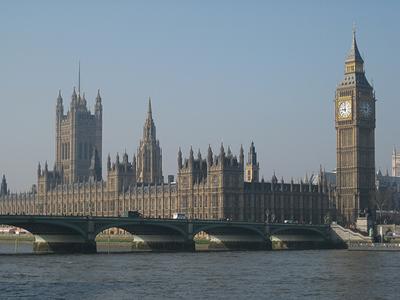Southampton chemists take their science to Parliament

Dr Peter Richardson, Rachael Wilkinson, and Julien de Sousa, are today (9 March) attending Parliament to present their science to a range of politicians and a panel of expert judges, as part of SET for Britain poster competition and exhibition. Their work has been chosen from a wide range of applicants, to encourage, support and promote Britain's early-stage and early-career research scientists, engineers, technologists and mathematicians who are an essential part of continuing progress in and development of UK research and development.
Peter is working to develop a new manufacturing method called supercritical fluid electrodeposition that will miniaturise computer chips to the nano-scale, as smaller components will result in faster and more efficient computers. Julien’s poster is on research about the development of new antidotes against organophosphorus nerve agent poisoning, while Rachael's work focuses on the development of potential new antibiotics. Their posters will be judged against dozens of other scientists’ research in the only national competition of its kind.

On presenting his science in Parliament, Peter said: “SET for Britain is a fantastic opportunity to present my work to a wide audience and I am honoured to be given the opportunity to attend. I look forward to speaking with our key policy makers, and to also learn about the cutting-edge work of other early-career scientists from across the UK.”
Julien said: “This is a unique and exciting opportunity for me, as an early-career researcher, to be able to present my work to my peers, MPs, and other Parliamentarians. During this day, I hope to disclose the importance of science, its impact to society and promote our new research in a topical concern.”
Rachael explained: “The threat of the emerging antibiotic crisis has recently received a lot of attention from the media and Government. I hope that I will be able to discuss with MPs how my PhD project aims to help tackle this issue. Furthermore, I think it is important to encourage the Government’s backing of research projects into the discovery of novel targets for antibiotics.”
Andrew Miller MP, Chairman of the Parliamentary and Scientific Committee, said: “This annual competition is an important date in the parliamentary calendar because it gives MPs an opportunity to speak to a wide range of the country’s best young researchers. These early career engineers, mathematician and scientists are the architects of our future and SET for Britain is politicians’ best opportunity to meet them and understand their work.”
The competition will end in a gold, silver and bronze prize-giving ceremony. Judged by leading academics, the gold medallist receives £3,000, while silver and bronze receive £2,000 and £1,000 respectively.
Professor Helen Fielding, from the Royal Society of Chemistry, said: “As a member of the chemistry judging panel, it has been inspirational to see so many excellent posters from the finalists. Chemistry is crucial to society, playing an important role in energy, health, food, and tackling climate change.
“Inspiring young people into science is also crucial for the UK’s economic growth and job creation. We hope that many more talented scientists – like these finalists – have the opportunity to contribute to society. I’m thrilled to see such excellent and inspiring science going to Parliament.”
Dr Mark Downs, chief executive of the Society of Biology, said: “Scientists and politicians both have major roles in addressing some of society’s biggest challenges, from climate change to food security. SET for Britain is a rare opportunity for politicians to meet some of our most promising young scientists and understand their work.
“It is important that MPs make policy decisions informed by evidence, and a greater mutual understanding between MPs and scientists will improve this. This is a message that is even more important just ahead of a General Election. The next Government needs to ensure the UK continues to lead the world in biological research where we have enormous strength”.
The Parliamentary and Scientific Committee run the SET for Britain event in collaboration with the Royal Society of Chemistry, the London Mathematical Society, the Institute of Physics, The Physiological Society, the Royal Academy of Engineering, the Society of Biology and the Society of Chemical Industry, with financial support from BP, Wiley, Essar, INEOS, the Clay Mathematics Institute, Warwick Manufacturing Group (WMG), the Bank of England and the Institute of Biomedical Science.
Other University of Southampton sites
Links to external websites
The University cannot accept responsibility for external websites.